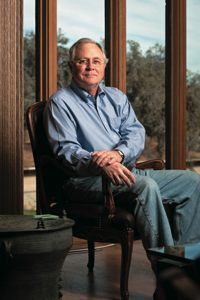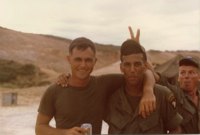
James T. "Tom" Hill
First Lieutenant, 2-502 Infantry, 101st Airborne Division
October 1969-October 1970
In my senior year of high school in Texas, even though a friend of my father’s had helped me secure appointments to the Air Force Academy and the Naval Academy, I told my family, “I don’t want the military.” I was a competitive high school tennis player at the time, and Trinity University in San Antonio had a terrific tennis program, so in 1964 I went there sight unseen. It turns out, they had compulsory Army ROTC. By 1966, with the Vietnam War going hot and heavy, I thought, “Maybe I’ll just stay in this thing and go as an officer.”
I was a political science major, and after my junior year I went off to ROTC summer camp and found that I enjoyed the camaraderie. I decided I wanted to be an infantryman, and in 1968 if you asked to be an infantryman, you were an infantryman.
I graduated in May 1968 and got orders to Ft. Benning, where I managed to wrangle a Ranger slot and an airborne class. Once I got out of having to run in formation and started rappelling and climbing, I gained confidence and did very well on leadership patrols. I went on to Ft. Hood, where there was a lot of sitting around in motor pools and a lot of unhappy people living in old barracks. It turned out to be a great research lab for how to deal with people. Four months later, I received an assignment to the 101st Airborne Division in Vietnam. I think the insight I gained there served me well in Vietnam.
When I arrived at my unit at Camp Eagle, the first sergeant told me I’d be taking over a platoon in Alpha Company. The next morning I climbed on a resupply bird and flew out to a one-ship landing zone in the jungle. A lieutenant named Jim Hall walked across the little LZ as they were kicking C rations and ammo out of the bird. He shook my hand and said: “It’s a good platoon. Good luck.” Then he climbed on the chopper and took off. I’m standing there in the middle of this LZ thinking, “Welcome to Vietnam” – not how I had envisioned a change of command.
 The battalion was operating from Firebase Rifle in Northern I Corps. The NVA were coming in and out of the mountains for resupply, or sitting there and making raids into the lowland area. This was October 1969, and we were in a lot of meeting engagements. In my first firefight at a trail junction, the guy behind me engaged two NVA walking up the trail. Everybody hit the ground. I’ll never forget the noise. The artillery FO was already calling artillery. We laid down a huge base of fire, and when the returning fire stopped, we began clearing forward and found two dead guys. I called up the medic, who started going blubbery, and said to him, “You need to figure out how you’re going to deal with this gore.”
The battalion was operating from Firebase Rifle in Northern I Corps. The NVA were coming in and out of the mountains for resupply, or sitting there and making raids into the lowland area. This was October 1969, and we were in a lot of meeting engagements. In my first firefight at a trail junction, the guy behind me engaged two NVA walking up the trail. Everybody hit the ground. I’ll never forget the noise. The artillery FO was already calling artillery. We laid down a huge base of fire, and when the returning fire stopped, we began clearing forward and found two dead guys. I called up the medic, who started going blubbery, and said to him, “You need to figure out how you’re going to deal with this gore.”
He put his M-16 on my chest, backed me up to a tree and said, “You get me a helicopter to get my ass out of here!” The platoon sergeant pulled a weapon on him. I told the sergeant, “Put that damn thing down.” I spent the next couple of minutes talking to this kid. He lowered his M-16 and we got him out of there. I think at that point my guys knew that I was pretty cool.
It as a good platoon. I had a mixture of mostly draftees and NCOs. We had as good a body count as any platoon in the battalion. After a few months, I became recon platoon leader. I knew field craft and how to move and live in the jungle. There was a feeling in that recon platoon that we were clearly the best of the battalion. My platoons were always very aggressive; we didn’t go out there and sit around and not try to find a fight. One time, we stumbled into the better part of a regiment during a 30-day off and on fight. Interestingly, we found intelligence at their base camp that our battalion had essentially decimated this unit two or three months before. They had reequipped and had come back to locate our battalion and pull us into a fight. They were damn good soldiers, a decent enemy. I was wounded twice in that fight and received two Purple Hearts.
Three months later, I became executive officer of Alpha. It couldn’t have been more than 60 days before I became company commander. It was a big step up.
My biggest challenge in company command was synchronizing fire and controlling platoon leaders. One time, one of my platoon leaders, an experienced guy, got me lost and I really chewed him out. When it was over, I thought, "Well, isn’t that interesting," and remembered a time when I was a platoon leader and really got my company commander lost. He chewed me out something ferocious, and I thought, “If I’m ever in the position to do this, I’ll never talk to a fellow officer the way this asshole is talking to me.” But it was the right approach because it got everyone’s attention. My platoon leader had become lackadaisical with his map reading and could have gotten us killed.
I was in company command about two months, as my last assignment going out. I considered extending my tour, but I was engaged and ready to go home. Forty-eight hours from Vietnam, I’m in San Francisco. I walked into a bar in greens with my double eagles, sat down next to a 101st guy from World War II and he got me drunk as a skunk.
In 1975, I was at Ft. Hood when Saigon fell. Clearly we had failed, and we had 55,000 people dead. We had an Army in ruins. I wondered, what was the sacrifice about? I don’t think we were ever really 100 percent committed in Vietnam. We were incrementally getting into it, incrementally getting out. I came close to getting out of the Army then.
While other soldiers were traumatized and had trouble with civilian life, I have not had any of that. I look back on my entire military career, and to this moment my single greatest honor and privilege was commanding that infantry company in Vietnam.
General James T. Hill retired in 2004 after serving as commander of the U.S. Southern Command from 2002 to 2004. He is credited as being one of the architects of rebuilding the Army in the wake of Vietnam. In February 1991, General Hill served as brigade commander in the 101st Airborne Division, when he played a key role in Operation Desert Storm and winning the Gulf War.
Adapted with the permission of Texas Tech University Vietnam Center and Archive Oral History Project, www.vietnam.ttu.edu/oralhistory.
Published in the April 2012 issue of Vietnam magazine.




